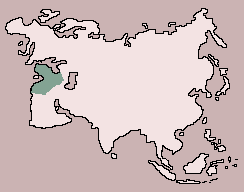Great Mouse-Tailed Bat

| Class: Mammalia:
Mammals |
Diet: Flying insects |
| Order:
Chiroptera: Bats |
| Size: body:6
- 8 cm (2 1/4 - 3 in), wingspan: 17 - 25 cm (6 3/4 - 10 in), tail: 6 -
8 cm (2 1/4 - 3 in) |
| Family: Rhinopomatidae:
Mouse-tailed Bats |
Conservation Status:
Non-threatened |
| Scientific Name:
Rhinopoma microphyllum |
Habitat: treeless
arid land |
| Range:
Middle and Near East |
 Colonies
of thousands of mouse-tailed bats occupy roosts in large ruined buildings,
often palaces and temples. They feed exclusively on insects, and in those
areas where a cool season temporarily depletes the food supply, the bats
may enter a deep sleep resembling torpor. Prior to this, they lay down
thick layers of fat which may weigh as much as the bats themselves, and
with this they survive for many weeks with neither food nor water. As they
sleep, the accumulated fat is used up, and by the time the cold season
is passed, nothing of it remains. Mouse-tailed bats mate at the beginning
of spring, and the female produces a single offspring after a gestation
of about 4 months. The young bat is weaned at 8 weeks but does not attain
sexual maturity until its second year. Colonies
of thousands of mouse-tailed bats occupy roosts in large ruined buildings,
often palaces and temples. They feed exclusively on insects, and in those
areas where a cool season temporarily depletes the food supply, the bats
may enter a deep sleep resembling torpor. Prior to this, they lay down
thick layers of fat which may weigh as much as the bats themselves, and
with this they survive for many weeks with neither food nor water. As they
sleep, the accumulated fat is used up, and by the time the cold season
is passed, nothing of it remains. Mouse-tailed bats mate at the beginning
of spring, and the female produces a single offspring after a gestation
of about 4 months. The young bat is weaned at 8 weeks but does not attain
sexual maturity until its second year.

  
|
